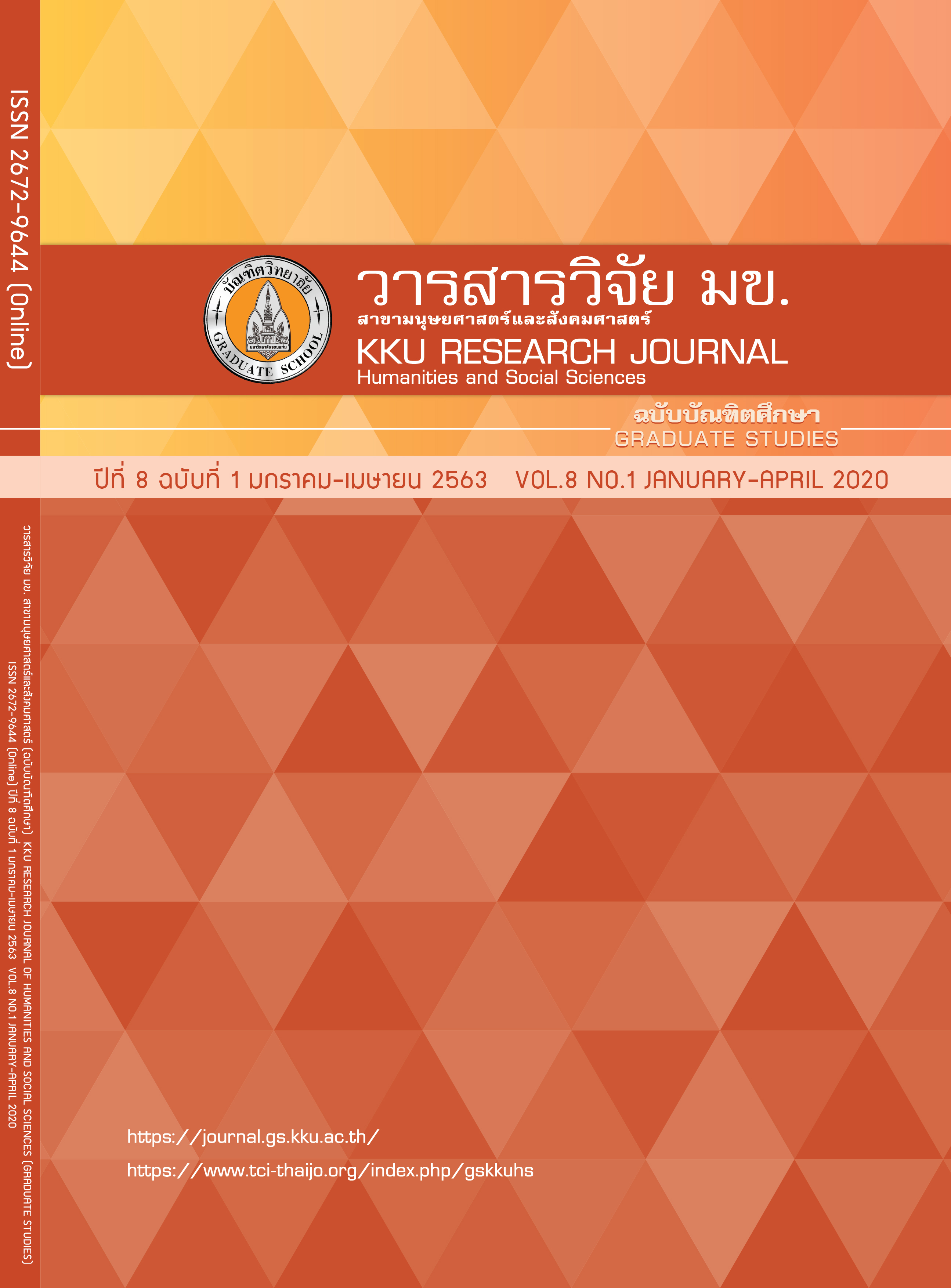The Influences of Knowledge Management on Competency, Dean Office Faculty of Medicine, Khon Kaen University
Keywords:
Knowledge management, CompetencyAbstract
This research presents the results of a study into 1) knowledge management process and competency 2) factors related to knowledge management and competency and 3) knowledge management factor on competency, Dean Office Faculty of Medicine, Khon Kaen University. By mixed research, Qualitative researches, In-depth Interview from key informants, 13 key informants were In-depth Interview. And Quantitative research the samples were 247 personnel randomly selected, by Simple random sampling. The population was determined from the personnel, At Dean Office Faculty of Medicine, Khon Kaen University. Data collection was carried out from June to September, 2018. Data distribution was performed by descriptive statistics. Inferential statistics were Pearson’s product moment correlation coefficient and stepwise multiple linear regressions were also utilized. The results showed that Knowledge management factor, overview at high level with averages of = 3.57, S.D. = 0.77, and personal competency, overview at high level with averages, = 4.09, S.D. = 0.70, were found positive correlated as a whole with a high level at 0.01 level of significant. The multiple correlation coefficient (r = .544**) could predict at 33 percent (R2 = 0.330, p-value<0.001).
References
developing 21st century manpower. 2016. Thai.
2. Kapland RS, Norton D.P. Strategy maps: Converting intangible
assets into tangible outcomes. Massachusetts: Harvard Business
School Press; 2003.
3. Brown J., and Duguid P. Organizing knowledge.
California Management Review. 1998; 40 (3): 90-111.
4. Watthanabut B. Human Capital Potential development
In 21st century. Dhammathas Academic J. 2016; 16(2):
163-176. Thai.
5. McClelland DC. Testing for Competence rather than for
Intelligence. American Psychologist. 1973; 28: 1-14.
6. Parry B S. The quest for competencies: training.1996;
7(33): 48-56.
7. Phornprasit Y. Factors Influencing success of knowledge
management of Bangkok Metropolitan Administration:
A case study of Southern Bangkok cluster. STOU Journal of
Management Science. 2014; 12(1): 50-61. Thai.
8. Asian Productivity Organization. Knowledge management
tools and techniques manual. Japan: Asian Productivity
Organization; 2010.
9. Tanhakorn T. Success factors for creative entrepreneurs
in the creative economy. Veridian E-Journal, Silpakorn University.
11(1): 396-410. Thai.
10. Srisongmuang P. Motivation and organizational climate
affecting the knowledge management of personnel at the 7th
Office of Disease Prevention and Control, Khon Kaen Province.
KKU Res J (GS). 2018; 18(2): 78-89. Thai.
11. Yingyos K. Knowledge Management In Organization &
Case. 2006. Thai.
12. Yingyos K. Innovative organization: concept & process.2009.
Thai.
13. Smithikrai C. Personnel Training In Organizations. 2011.
Thai.
14. Education Criteria for Performance Excellence: EdPEx
2015-2016. Thai.
15. Thailand Quality Award: TQA. Thai.
16. Government Gazette. Royal Decree on Criteria and
Procedures for Good Governance, B.E. 2546 (2013). Thai.
17. Marquard J. Building the learning organization:
system approach to quantum improvement and global
success. New York: McGraw-Hill; 1996.
18. Nonaka I., Toyama R., Nataga, I. A firm as a knowledge-
creating entity: A new perspective on the theory of the firm.
Industrial and Corporate Change. 2000; 9(1): 1-12.
19. Kumchai S. An organization commitment of
government officer: a case study of Royal Irrigation
Department. 2009. Thai.
20. Gunthain S. Achievement of knowledge management
towards learning organization at Chiang Mai University
Library. 2011. Thai.
21. Analoui BD. Leadership and knowledge management
in UK ICT 10 organizations. Journal of Management
Development 2013; 32(1): 4–17.
22. Biala J. Process, tools, and culture: three dimensions
of knowledge management. Alexandria: Public Manager.
2013.
23. Baran M., Klos M. Competency models and the
generational diversity of a company workforce.
Economics and Sociology. 2014; 7(2): 209-217.




